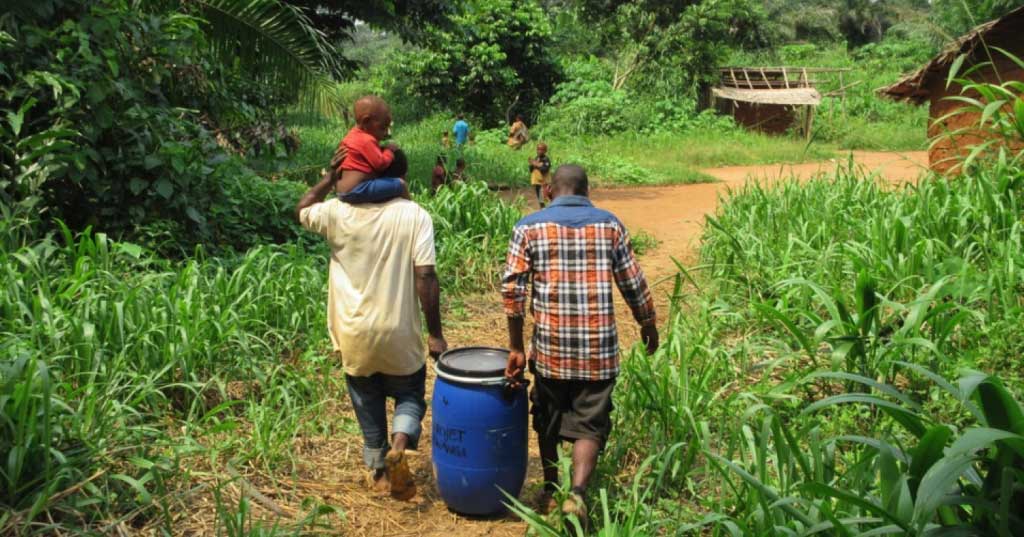
Project Bwanga has developed a system of portable mobile clinics run by local traditional healers to provide meaningful and effective health care to hunter-gatherers and other remote forest people. It enables these communities to have access to health-care that is free from discrimination and restrictions.
The project trains community-selected healers to effectively diagnose and cure the most commonly experienced diseases using a limited set of generic drugs, and ensures the inclusion of hunter-gatherers in vaccination campaigns for the most common childhood diseases (following Congolese Government guide lines).
The project has so far trained 20 community-selected healers to effectively diagnose and treat the 10 most commonly experienced diseases using a limited set of generic drugs. Using a ‘step-wedge’ approach subsequent trainings teach further skills e.g. diagnosis and treatment of skin diseases, STI’s as well as giving antenatal care and health education about HIV/Aids, tobacco & alcohol.
The Congolese Health Service delivers vaccination programmes and some free medicines for certain diseases via outreach programmes but struggles to serve remote forest communities. For the majority of the population of Northern Congo the few existing public and private hospitals or health posts are too far away to reach.
Project Bwanga addresses this problem by:
Aims
Objectives
It is obvious that the training of a largely non-literate people in the use of western medicines and their safe dosages requires an adapted approach. The project has developed a system to label medicines with pictograms rather than writing, to explain dosages using pictograms, a financial accounting and stock management system for the innumerate, and a training strategy adapted to non-literate people.
Project Bwanga Cross-Cultural Training Outline:
In 2021 the majority of Mbendjele are non-literate. Knowledge is transmitted by means of traditional teaching methods. These include:
In order to be effective training has to be sensitive and meaningful to Mbendjele culture. In Mbendjele life it makes little sense to give the type of theoretical instructions a Westerner may be used to. When you find yourself in the forest in proximity of a Gorilla you will need to know what a Gorilla’s warning bark, or a charging Gorilla sounds like in order to take appropriate action. The theoretical instruction issued by Western experts: ‘avoid eye contact and adopt a submissive pose’ do not prepare you to what the warning bark of a gorilla or a charging gorilla sounds and feels like. These ‘sound signatures’ being taught through re-enactments of actual encounters with Gorillas educate listeners. All knowledge is transmitted context specific.
Sick people move in certain ways, have certain expressions and make certain sounds. A person with a severe headache has a certain ‘headache face’. In our training we capitalize on key observations, sounds, classic postures or movements that can be commonly observed in people suffering from the illnesses we aim to address. In this training we employ all of the traditional teaching and learning methods present in Mbendjele life.
Negotiating Free Prior and Informed Consent (FPIC) for the training of traditional healers in primary health care is a process. It consists of informing the affected persons about the planned activities and their impacts – both positive and negative – and verifying that the information provided has been understood, before explicit consent can be negotiated. If people refuse, their decision is respected. Wherever possible FPIC should be preceded by preliminary research in the intervention area involving anthropologists and/or other researchers that speak the local language and are trusted by the communities.
The Theory behind the FPIC Process:
Consent
Consent is required from people in situations where any externally initiated activity, by state agencies, private enterprises or NGOs, may impact on the lives and livelihoods of individuals and communities. A compromise between local and international understandings can be obtained by ensuring that, if people give their consent, it is in a manner that is understood as contractual by both parties.
Free & Informed
The exercise of free will is essential for any agreement to represent genuine consent. Communities must be able to accept, negotiate or reject a proposed intervention by third persons without any duress. Communities must have the possibility to refuse consent. Likewise, they must be able to withdraw their consent if the terms on which it was negotiated are not respected. Their consent is only meaningful on these terms. Fair, non-coercive negotiations respected by all participants produce lasting and sustainable agreements. Specific approaches and strategies that take into account socio-cultural and linguistic differences and literacy levels must be developed to fully inform people of both potential positive and negative consequences. These may include, for example, theatre techniques or site visits, rather than written documents.
Prior
Consent must be negotiated before people are affected by external actions. In situations where activities have already taken place before a FPIC process has begun, consent must be sought for any further activities once a FPIC approach is applied. Prior engagement should enhance the success of projects by defusing potential conflicts and creating partnership opportunities at the beginning. The earlier a FPIC process is implemented the more lasting and sustainable the benefits for all stakeholders will be.
